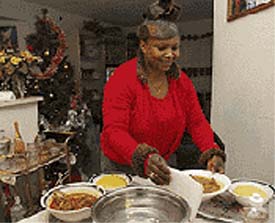
Mama runs a house restaurant -- a semi-secret, unlicensed eatery that operates out of her crowded two-bedroom apartment in Aurora. "I talked to her on the phone yesterday," my friend Mark says. "Just to make sure she was still cooking today. And she said yeah, from eleven o'clock through."
Mama's kitchen doesn't take reservations. Dinner is catch as catch can. You knock on the door and maybe Mama's there, maybe she's not. Through means there will be pots on the stove, but it does not necessarily mean that anyone will be there watching them.
Ghana RPCV Mark Manger says: There's no place like Mama's House
Mama's House
For Ghanaian immigrants, there's no place like home.
By Jason Sheehan
Published: Thursday, January 5, 2006
Caption: Keep the home fires burning: Mama T prepares the last supper.
Mama T is leaving.
She's moving to Cincinnati, where her husband is working a factory job now, where there's another apartment waiting, another community expecting her. She's going with her son Rafael, and she's taking her pots and pans. She's taking her living-room set with the white lace doilies. She's taking her recipes and her traditions. And after she goes, there will be nowhere for Denver's tight-knit community of Ghanaian immigrants to eat.
Mama runs a house restaurant -- a semi-secret, unlicensed eatery that operates out of her crowded two-bedroom apartment in Aurora. "I talked to her on the phone yesterday," my friend Mark says. "Just to make sure she was still cooking today. And she said yeah, from eleven o'clock through."
Mama's kitchen doesn't take reservations. Dinner is catch as catch can. You knock on the door and maybe Mama's there, maybe she's not. Through means there will be pots on the stove, but it does not necessarily mean that anyone will be there watching them.
Mama has been running her house restaurant, in a variety of homes, for six years. Mark had eaten at her last spot, but he's not sure where she's cooking now. "When I called, I asked her where she was," he says, skidding his old Volvo to a stop on Parker Road. "And I don't know...she speaks good English, but sometimes it's still hard to understand her. Or hard for her to understand me."
He reaches into the back seat, pulls out a camera case and digs around in the pockets for a scrap of paper that has assorted address permutations scratched on it. "Side of Florida and Dayton," he says, mimicking Mama, his voice slowing, tongue thickening. The accent is strange and almost Caribbean -- one that makes "Florida" into three distinct syllables and "Dayton" into Day-tone. "That's what she said to me, but the address? I don't know. I wrote down a couple, so we'll see."
Mark spent three years in Ghana as a teacher with the Peace Corps. He loved the country and wants to get back there someday, maybe open a bar or a school of his own. His Peace Corps work is his connection to Denver's Ghanaian community, the community his connection back to Ghana, and as he drives through the snow, we talk about the people, the culture, the diaspora that sent tens of thousands of displaced Ghanaians to the United States (roughly 3,000 call Denver home). Mostly, though, we talk about the food, about what he ate while he was there, what he misses most and what he now has to go to Mama's to get.
In Ghana, the men don't cook, he tells me; the women do. But that isn't to say they just stay home, chained to stoves, tending to home fires. Rather, they run restaurants.
"If you were to get a job managing, say, a gas station in Ghana -- which would be a very good, very respectable job -- your wife would immediately find a place close by to start selling food," Mark explains. This might be as simple as a charcoal grill set up by the side of a road, where she'd sell grilled meats or plantain or kabobs. The next step up would be a couple of chairs, a screen so others passing by can't see those eating. After that, a roof. After that, walls.
The fanciest restaurants in Ghana are Chinese -- rice being a special delicacy in the starch-obsessed food culture -- and fried-chicken places. Mark tells a story about a Ghanaian who got a job managing a Kentucky Fried Chicken in Germany. The industrious fellow stole everything that wasn't nailed down -- menus, recipes, signage, banners, kitchen equipment, what have you -- and had it all shipped back to Accra. When he returned home, he opened his own quasi-KFC, but because no one in Ghana would understand what "Kentucky" was, he called it Kiki Riki Fried Chicken. "It's a very famous restaurant in the north," Mark insists. "Ask anyone, and they'll probably know it."
But aside from Kiki Riki Fried Chicken, Ghanaian food hasn't been corrupted by colonialism or degraded by the influences of immigrants (except for the Chinese and their ever-present takeout operations). Today it's essentially unchanged from what it was centuries ago. At roadside stands, in shacks and "chop bars" and gas-station parking lots, the people eat beans and non-native corn. They eat fish and rice balls and risen, raw starch dough called fufu, which is made from pounded plantain and cassava root. "You'll see these guys who are just all biceps pounding the cassava," Mark says. "They use what looks like a whole tree trunk and just pound the shit out of this stuff until it's like a paste."
The meat is primarily goat, although the Ghanaian diet also includes chicken and fish. And because the Ghanaians like their meat prepared in very specific ways, they've found unusual sources here in Denver. The goat, for example, is specially processed by a rancher out near the airport, with the animals butchered whole with their thick skin and subdermal fat left on, their hair taken off with a blowtorch. "If you're not cutting bone, you're not cutting meat," Mark explains. "That's what they say. And the goat is cooked skin and bones and all."
American food horrifies most Ghanaians, so the community feeds itself out of necessity. There are African markets that sell prepared foods -- prepared, always, by someone's wife or sister -- and a few Chinese restaurants that cater to the immigrants. But because most of them are men who've left their wives and families behind to come work here and send American dollars back home, there is also Mama's, where they can gather to gossip, argue politics and eat.
"With Mama leaving, this is a very big deal," Mark says. "Everyone is trying to figure out who'll cook after she leaves, whose wife will take over. Everyone has been talking about it, saying, ŚWhat about your wife? No, what about yours?' If someone has a wife who comes here and just wants to be a housewife, they say, ŚNo! You can't just be a housewife in America. You have to work!' But really, they all just want to know where they'll be able to eat what they like."
Tonight, though, is Mama's last night in business. Tomorrow is her going-away party at the Knights of Columbus hall. After that, she'll be gone.
"Hey, this looks promising," Mark suddenly shouts, pointing across the dashboard at a block of cookie-cutter apartment buildings that look just like every other block of apartment buildings we've passed. "Can you see the address?"
I can, and though it doesn't precisely match the number Mark has written down, it does share four of the five digits, in tumbled order.
"Let's try it," he says, and slowly guides the Volvo in.
We find a building number that matches and an apartment number that's close. Mark knocks.
No answer.
"This doesn't look good," he says. "Usually you'd hear voices, music, people inside. I don't know."
He knocks again. I smoke a cigarette and watch the snow fall, watch it haloing around the parking lot lights. It's quiet for a Saturday night. Mark says it's possible that Mama has stepped out and will be back momentarily, that she's tired and just not answering the door. Of course, this could also be the wrong place entirely.
We decide to continue looking, cruising through townhouse developments while Mark makes phone calls, trying Mama's number and getting no answer, calling a friend at Air Afrik who he thinks knows a guy who might know the right address.
It suddenly occurs to me that I've had a lot of nights like this one. Nights spent looking not for goat bones, but for girls or The Man. The messages that Mark leaves have that same edgy expectancy I remember from nights spent hunting for eight-balls or trying to run down the weed guy on a Friday night. And that guy who knows a guy? Jesus, how many nights have I wasted chasing him?
"Okay," Mark suddenly says. "I've got an idea. We're going to go see Francis."
Francis works at Kantamanto Market, maybe even owns Kantamanto Market, I don't know. More important, Francis knows Mama, so he's our man.
Kantamanto is a small African grocery that sells fresh produce, canned goods and staples like fufu flour, hairnets and gum. In the cooler, there's Guinness Malta (a non-alcoholic health drink made by the same company famous for selling a similar, very-much-alcoholic health drink to generations of Irish); on the shelves are cans of fish paste, international calling cards and DVDs. The market is invisible from the road, shoehorned into a tiny space behind a liquor store off Havana -- one of those places you just have to know about before you can find them.
We step inside, into the crowded warmth and close-set shelving, and the first thing I notice is the smell. It's indescribable -- not bad, but totally alien, earthy and thick, made up of the skins of vegetables I've never tasted, herbs I couldn't name on a bet, powerful cologne, cardboard boxes that have traveled halfway around the world, machine oil, earth and blood. It hits me like a punch, the way stepping into a greenhouse does, the way stepping into a Whole Foods or Cost Plus World Market never will. It is both the smell of food up close and life far away. In a place like this, even the air is foreign.
Conversation stops when Mark and I step inside -- in that awkward moment of trespass, crossing a very real social border between one world and another. Kantamanto Market exists to serve a specific community, and it's one that Mark and I are not a part of (not on the surface, anyhow). It's a color thing, of course. It's also a language thing, a culture thing, a taste thing. But in this first instant, we're just a weird curiosity: two white guys coming in from the cold on a Saturday night.
But that passes quickly. I'm instantly entranced by the food and start fondling the giant yams, the dusty baggies of cola nut and crystallized ginger, the tiny African eggplants called "garden eggs," no bigger than golf balls, each carefully wrapped in tissue paper. And Mark just starts talking, his voice doing that trick again -- slowing and thickening and taking on an accent so natural, he might as well own it. He's comfortable here, and since Francis is busy inside the little glass booth where the register is (taking money from customers through one slot, talking through a circle of holes like you see in gas stations in bad neighborhoods), Mark drifts over to a group of young men who are just standing around and asks about the weather. He asks their names, where they're from, how they ended up in Denver, how they like it and why they left Ghana.
The answer to that last one is always the same. Jobs. American money. A better life. A chance to return to Ghana someday as very rich men.
Mark talks about the Peace Corps, asks them about their wives, their girlfriends. Somewhere in the back, a band saw starts up -- the sound unmistakable -- and shortly after, a young kid passes by pushing a cart loaded with big, bloody, raw hunks of goat meat bound for the coolers. A half hour passes before the negotiations really start, before Mark says, "So, do any of you guys know Mama's new place? My friend and I want to eat Ghana food tonight."
Immediately, there are raised voices, hands waving in the air. No, they say. Mama is leaving. Mama's not cooking anymore. Mama is gone.
"No," Mark replies. "I talked to her yesterday. Yesterday she tells me today is her last day. Today she would be cooking from eleven o'clock through."
"Through?"
"Eleven o'clock through," Mark insists.
The men convene a conference, all speaking in a language that Mark understands only a little, and me not at all. Francis comes out of his booth to talk to Mark, then to the men. A consensus is reached that it's possible Mama might be cooking tonight. Now Mark just has to figure out where.
Ghanaians are not, apparently, a people who care much for addresses.
Finally, two of the men -- K.B., who's big and quiet, and Akwesi Hanson, who's short and talkative -- decide to take us to the place where they think Mama may or may not be. "Come on," Akwesi says. "You follow us. We'll find her." Akwesi holds open the door, and the four of us are washed back out into the cold on a wave of alien smells and reggae music.
Fortunately, the drive is quick. A couple of turns, a moment of hesitation at the intersection, and then Mark and I follow K.B. and Akwesi right back into the parking lot of the first apartment complex we tried, the first door we knocked on.
"Isn't this -- " Mark starts.
"Yeah," I say. "It is."
Again we climb the stairs. Again we knock on the door. And again there's no answer.
"She's not home, I think," Akwesi says, shrugging his big jacket with the fur hood close around his thin shoulders.
K.B. pulls out a cell phone and retreats to the car. He's only been in the country a short time and doesn't like the weather. Akwesi, though, has been here for years. He, Mark and I stand out in the cold talking about Ghana, where it is seventy degrees every day and the sun never stops shining. Akwesi tells me that his name means "Sunday-born," and how everyone in Ghana is named after the day of the week on which they are born. He has no idea where the name Hanson came from.
After a few minutes, K.B. calls Akwesi over to the car.
Mark starts apologizing. "I'm sorry this has taken so long," he says. "I'm sorry she's not home. I wish I could have planned this better."
How can I explain to him that this is what I wanted? Exactly this, with all the confusion and the waiting, the anticipation and disappointment. That I would gladly trade a hundred nights at places with actual addresses and menus for this, the car and the cold and the company we've found. That this -- all of this -- is what I've been looking for since I started this job: an experience not just of food, but of the culture that food nourishes and the people that culture serves.
I say it just like that, I suppose -- and do.
Akwesi shouts from the car and calls us over. We're going back to Kantamanto, he says. They have a plan.
At the market, K.B. shops for me. He opens a green plastic cooler set at the head of one of the aisles and takes out two plastic-wrapped tubes that look like fat tamales wrapped in banana leaves. This is kenkey -- fermented cornmeal dough a lot like masa that's left to ripen in the sun. He sniffs one, nods his head, tucks both into the crook of his arm and then, as an afterthought, grabs two more that don't have the banana-leaf wrappers. He picks out a tomato, an onion, roots around on the shelves until he finds a can of sheto, a herring, shrimp and vegetable paste cut with a wicked dose of red chile. He gathers everything, brings it to the counter, taps the pile of supplies with one hand.
"This," he says. "This will make you dinner. Just in case."
Meanwhile, Mark and Akwesi have been talking with more men at the market, and it seems that someone has heard about our plight and knows someone who knows someone who knows where Mama might be: at a strip-mall salon a few blocks away, getting her hair done for her going-away party.
"We go there and we see," Akwesi says. "If she's there, maybe she'll cook for you."
"Probably she cook for you," K.B. adds. But if not, he's made sure that we have dinner covered.
Mark and I follow K.B. and Akwesi to the salon, where we find women in chairs, women under dryers, women having their hair sculpted into any number of improbable geometric configurations. Akwesi asks after Mama, then Mark asks after Mama. At first, no one will even admit that Mama is there.
K.B. starts explaining how to prepare the kenkey. "You chop the vegetables very small," he tells me, bringing the edge of one hand down into the palm of the other. You pinch off a piece of the kenkey, make a dent with your thumb, use that to scoop up the chopped tomato and onions and the sheto. There's a Chinese restaurant that caters somewhat to the Ghanaians just down the way, he adds, pointing, "a little that way." It's one of those buck-a-scoop places that I can never understand how it stays in business. Now I know.
"Go there," he says, "and you ask for the tilapia, fried." It's not on the menu, of course. "Before they cook it," he continues, "say add salt, okay? Extra salt. There's salt already in the batter, but you want more."
"And that tastes just like Ghana food?" I ask.
"Just like," says K.B., smiling.
Mark returns with good news. "Mama's here," he says. "She's in the back. They're getting her."
I ask if we still have a chance at getting dinner.
Mark shrugs. "At first they wouldn't admit she was here," he says. "This is such a Ghanaian thing, for her to say she's cooking, you know, eleven o'clock through, and then just leave to get her hair done. Maybe it was slow, or she just didn't feel like cooking anymore. We'll see."
And then Mama herself comes out, shorter than I expected, younger -- prettier, even -- with her hair slicked down with whatever it is that the stylists use to work their magic. She has a cape draped around her shoulders, and it's obvious that she's in the middle of a process, but when she sees Mark, she smiles and comes right over. "Mark!" she says. "How are you?" She takes his hand and leans in close between us, the classic conspirator's pose. "You want me to cook for you? Okay. But could one of you drive me back here when we're done?"
And just like K.B., just like Akwesi, Mama is only too willing to interrupt her life and her Saturday night in order to see the two of us fed. Anxious, even. She's halfway to the car with the goo still in her hair and the cape around her neck before we both insist that she should finish with her hair first. We can wait.
"You're sure?" Mama asks.
We're sure.
"Okay, then maybe nine o'clock I will be done. Then you can eat."
"You'll be cooking at nine?" Mark asks.
"Yes," Mama says. "Of course. Nine o'clock through."
We shake hands with K.B. and Akwesi in the parking lot, offer to stand them to dinner for their help.
"Not necessary," Akwesi insists.
"It's okay," K.B. says, reminding me again about the Chinese restaurant and to ask for extra salt.
Mark tells the guys that they should at least take a couple of beers. We have four bottles of Gulder Ghanaian lager in a bag in Mark's car. He offers them each one. They discuss it, refuse again, are asked again, agree to take one. Total.
"My friends," Mark says, "there are two of you. What will you do with one beer?"
More talking. An accord is reached, with K.B. and Akwesi taking one beer each for the road, followed by smiles and handshakes and sincere thank-yous all around.
"So it looks like we're going to get dinner after all," Mark says. "You ready?"
I am. I've been ready for years.
When we finally arrive at Mama's, it's nearly ten, but Mama welcomes us warmly into her home, takes our coats, seats us in her small living room dominated by couches and a huge TV showing an old rerun of Fresh Prince of Bel-Air, then gives us our options for dinner. She has some rice balls, but maybe not enough left to make a meal. She has soup, kenkey (of course), goat. There's a bottle of wine unopened on the sort of filigreed silver server I haven't seen since Christmas at my grandma's house, and gin in a plastic jug turned cloudy and brown by the spices, leaves and bits of bark steeping at the bottom. We ask for some of this, please, and please, a little of that. I let Mark do most of the ordering, because for the first time in a long time, I have no idea what I'm asking for and even less of what might eventually arrive.
Mama works fast in her little kitchen, almost silently -- a model of professional efficiency going through motions she's made a thousand times before. For six years, Mama has cooked almost every night, throwing what amounts to an impromptu, non-stop, round-the-clock dinner party for an unknown number of guests. You show up and she just cooks whatever is on hand, serves it on the same plates she uses to feed her family. Over the years, she's gotten so good at it that what would be a nightmare for any normal hostess is just her routine.
"You could show up at two in the morning hungry, and if she was there, Mama would cook for you," Mark had told me earlier. K.B., Akwesi, Francis, the girl behind the desk at the hair salon -- they'd all said essentially the same thing. Mama is a hostess in the truest sense of the word, a restaurateur stripped of all but the most essential character.
And we are her final table.
When dinner begins, we eat fufu, of course. Huge blobs of it, risen and smooth-skinned and yellow, served in big bowls. We eat banku and soup. We eat with our right hands only, as is the custom, pinching off a wad of the cassava paste and using it to scoop up mouthfuls of smooth, sweet peanut soup, okra broth or light soup with a slick of palm oil floating on top. Eating meat on the bone one-handed is a trick to learn, eating soup with no spoon impossible to do delicately. Mark just sinks his hand in to the wrist and slurps from his palm, packing his mouth with fistfuls of banku, and I take my cue from him. My broth -- the light soup -- is spicy but smooth, the burn mounting then fading away like that of a perfectly made posole or menudo. It's good and undeniably rustic, with a balance and precision of taste that comes only with long practice in the kitchen. The goat skin tastes charred and earthy, the meat is as chewy as boiled chicken, and the fat has a slick musk to it that lingers on my tongue and fingertips for days.
"Check this out," Mark says, lifting his dripping hand from the bowl. "A nipple."
He's right: goat-nipple soup. He pops the thing into his mouth with a grin and goes right back to eating.
No matter how intimate or authentic, the restaurant experience is an essentially isolating one. There are special rooms in which to dine, people paid to be accommodating to my needs, plates and pots and silver and glassware all made for the business of selling me on the vision of a chef or owner. In ethnic restaurants -- especially those that operate almost exclusively to serve a specific community the raw fish or pigeon or calves' brains or yucca they can't get at an Olive Garden or in a Happy Meal -- there's the added bonus of being served a taste of someone else's home, a slice of their memories of comfort and strange latitudes.
But here, I am home -- in Mama's home -- and she serves me on her own plates. The giant, battered stock pots that line her stovetop and the floor of her tiny renter's kitchen are the same ones from which she takes her own meals and serves her own family. I am offered the silverware out of her own drawers, a seat at her table and a meal unlike any I will probably ever have again. When I look over at Mama in the kitchen, she's smiling, watching us eat. There's a goat leg poking out of a stock pot, more pots stacked up everywhere, more rolled kenkey, more swollen mounds of fufu. Should anyone show up in the middle of the night looking for dinner, Mama will be ready.
But no one does. It's after midnight by the time I push back from the table, hand her a few crumpled bills and thank her for one of the best nights I've had in longer than I can remember. She smiles, nods and sees us to the door, just happy to be doing what she loves -- even if this is the last time.















